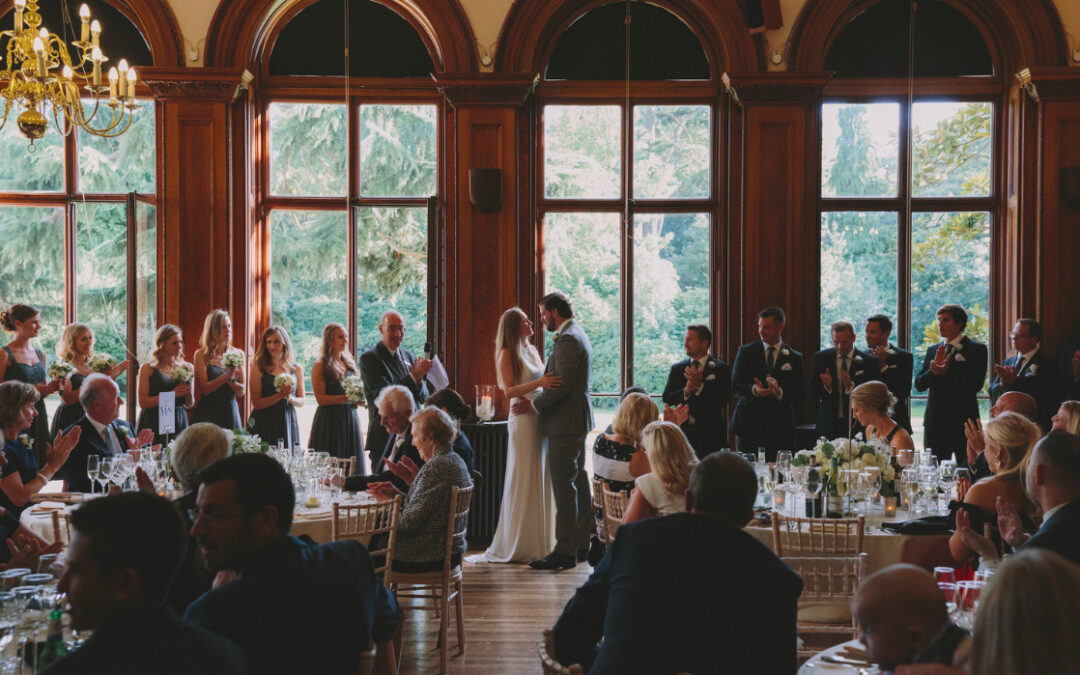
by Michael | Jul 23, 2024 | Blog
It goes without saying. If you’re holding a wedding, there will be guests.
Well, actually, I have conducted more than one ceremony where we were only three, so it’s actually not a given! Still, let’s ignore those exceptions for the purposes of this article!
We can assume that it’s great to be able to invite who you want, and great to be invited.
But is it always that straightforward?
Being a Guest
With the best will in the world, you may receive an invitation for a date that causes you issues. How easy – or worthwhile – will it be to juggle dates around to accommodate this wedding? Especially if you’re not particularly close to the engaged couple?
What if you have children, and they are not invited? Or what if you have a significant other who has been overlooked?
And it’s not unreasonable that money may be tight for you. You may find it hard to afford a lovely present, the expenditure on smart clothing, and travel costs, etc.
These are factors to be taken into account before you jump at the invitation.
Inviting your Guests
The thought of having all your favourite people together to celebrate your big day with you is most appealing. However, you must take into consideration your budget. How many people can you actually afford to invite? How do you choose who makes the cut? Do you introduce conditions, such as “no children”? Do you omit a “significant other”?
How inclusive do you make the occasion? Do you supply all food and drink, or organise a cash bar after a certain amount of hospitality?
You’re going to have to think about how you entertain your guests – they may have gone to quite some inconvenience to support you. What can you afford to offer that they will enjoy?
Guests are going to expect to buy you a present. Are you going to produce a Wedding List to guide them? How affordable will the items listed be?
Summing up
Of course, none of these potential problems may arise. You may know who you want to invite and be able to do so. They may be delighted to be asked and be very happy to attend. But the world doesn’t always move smoothly, so it’s as well to be aware of difficulties that may arise.
To chat about any ceremony, do have a word with me.
photo: mckinley_rodgers.com
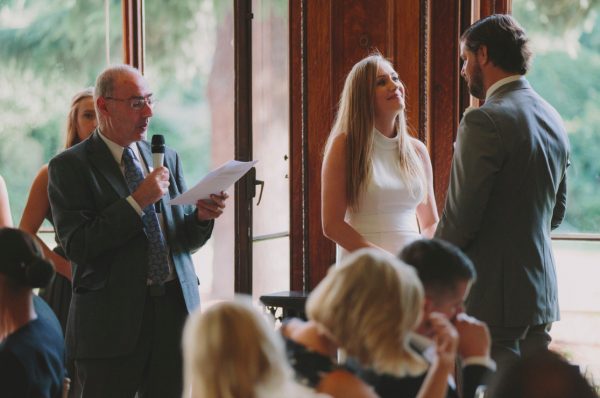
by Michael | Jul 16, 2024 | Blog
Most wedding services contain wedding vows recited by the couple. These may be traditional or novel.
The traditional ones will be of the “for better or for worse” type. The novel ones can be personal and unique (“I promise to walk the dog every day”), maybe with some humour.
The personalised ones require thought, of course. The traditional ones do not – but they can be sincere nonetheless, and they have stood the test of time.
Writing your own vows is not easy and, once your other half is engaged in it, becomes a commitment. You don’t want to let anybody down.
The fact that they are personal to you makes the vows unique. You may want to steer away from sentimentality, or that may suit you. You might want to throw in some humour, especially if your loved one has some idiosyncrasies! You might want to keep it short or you may have a lot to say,
The important thing is that you are sincere (and deliver your vows clearly).
Your civil celebrant can advise you,
Moving On
But time passes. Maybe your vows are no longer valid? You may both have changed over time, both emotionally, psychologically and physically. Perhaps your family has increased.
Whatever the circumstances, you may want to rewrite your vows and announce them.
So, how can you do this?
The simplest way is to organise a Vow Renewal ceremony.
This doesn’t have to be a grand affair (although it can be). It certainly doesn’t have to be formal (again, it can be). It can be down in your own back garden, say, or in a manor house. The great thing is that it doesn’t have to be legally registered or performed under certain restrictions. You can organise the do that you choose in the venue of your choice.
The idea is to have a memorable and fun (though partly-serious) occasion.
The running of the ceremony can be in the hands of your Civil Celebrant. Together, you put together the service of your dreams. Your celebrant can advise you about religious content (if any), rituals and who can participate and how. You sort the guests and refreshments.
Oh, yes, and the wording of the vows!
Please speak to me about a Vow Renewal. It’s such a happy event!!
photo: mckinley_rodgers.com
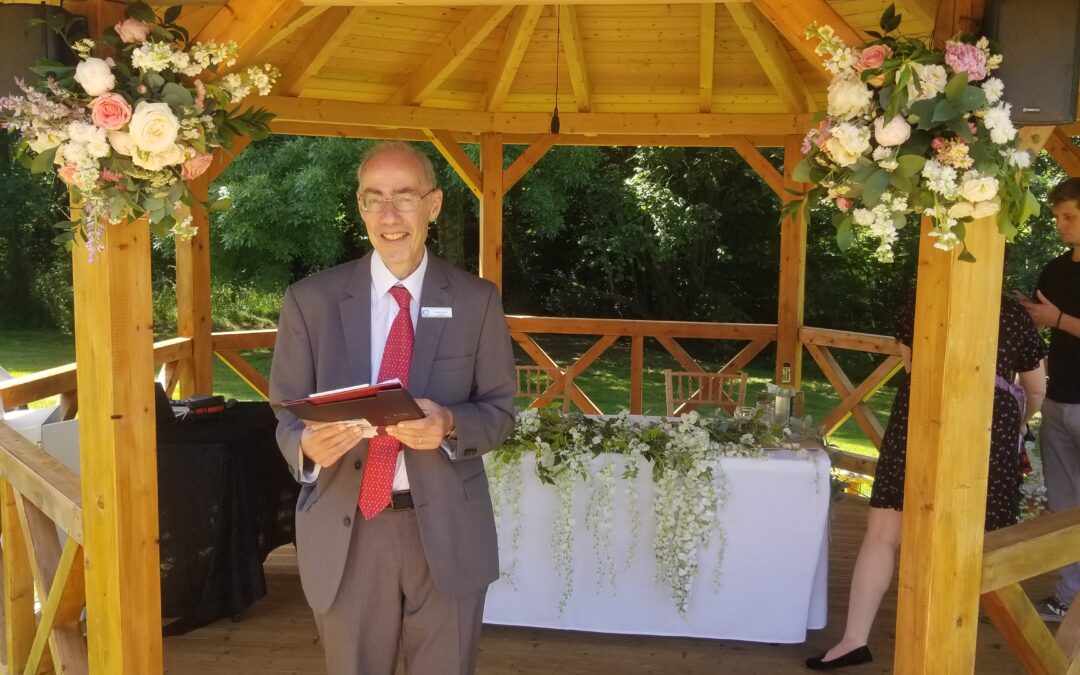
by Michael | Jul 8, 2024 | Blog
Unless you’re lucky and have personal knowledge of a celebrant, or you’ve seen them in action, you may well be in the dark about celebrants.
Clearly, they should have a website and this should give you an idea of what they look like and, possibly, sound like. You may be able to get an idea of their personality, so that’s not a bad place to start.
You may benefit from reading reviews – you may get a sense of whether they will understand your vision and facilitate it.
You may be able to learn their USP(s). Not everybody will be bothered that I can present in numerous languages, but it has proved important to quite a few clients over the years.
One very important asset to any celebrant is trustworthiness. One of the best ways of assessing this is to have a face-to-face meeting with them. You can ask the questions that concern you and sense how much (or little!) empathy you feel for them. It’s important to get this right, as you are going to want to feel happy that the person you have chosen to share the spotlight with you can be relied upon.
You’re probably going to want an experienced celebrant (for obvious reasons!). You normally have to pay for this. It’s worth bearing in mind that a celebrant has usually paid for a lot of training and boasts skills that are unique, especially in combination with each other. They are probably trade association members and have insurance.
Ts and Cs can be boring, but you should not ignore them. You need to know what you are paying for – and what is not covered. This includes cancellation policies. Don’t be afraid to ask for elucidation, if you don’t understand something you’ll be signing.
The right celebrant will make such a difference to your ceremony, so it’s important to do the due diligence. If you get it right, you definitely won’t regret it!
Please have a chat, if you want to continue discussing this theme.
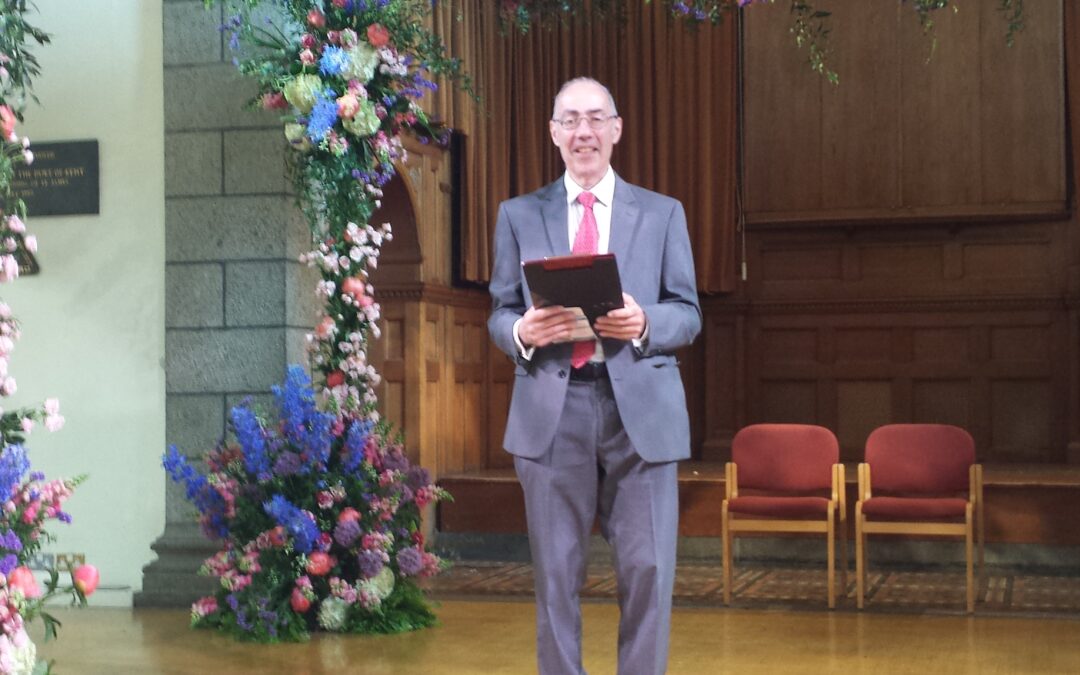
by Michael | Jul 1, 2024 | Blog
Saving money on a wedding is an attractive thought, but how realisable is it?
A wedding is (hopefully!) a once-in-a-lifetime event. You’re not going to skimp on things, if you can help it. You want everything to turn out perfectly. Quality matters.
So it’s reasonable enough that you have to pay for it.
There are certain areas you probably won’t be prepared to compromise about. These could include the rings, the wedding dress and make-up artist.
But it’s all very subjective. What is essential to one couple may hardly register in the list of priorities of another.
Therefore, my comments may not fit all of you in every way. Hopefully, they will still prove useful to most of you and offer some food for thought and practical suggestions.
Venue
One expensive area is the venue. It’s important that you both feel excited by the venue, so should not skimp. But do make sure you know what exactly you are paying for.
Be aware that you may be able to bargain a bit, if you choose to marry out of season or, possibly, earlier in the day.
Catering
This very much depends on the scale that you are aiming at. Silver service is convenient, but expensive. You may be able to save a bit by offering a self-service buffet. That can also help you deal with dietary issues among guests.
You will probably provide a bottle or two of wine (and water), but you may think about introducing a cash bar.
Wedding Planner
A wedding planner can be considered a major expense, but what price do you put on peace of mind? Some wedding planners can be hired for the day (or week), which may be an option for some. A good Wedding Planner is invaluable, especially for a larger affair – but not necessarily a necessity.
Officiant
Again, opinions may be divided here, but you should consider a Civil Celebrant (such as myself!). A Civil Celebrant gives you the freedom to choose exactly how you mark the ceremony. They offer the chance to stamp your own personality on the service as well as providing the elements that you really want to include.
Entertainment
There’s virtually no limit to the kind of entertainment you can offer. Your outlay will depend on your budget, as well as personal preferences. You may have to consider how to occupy children, what may be suitable for older guests and the logistics of dancing or photobooths and the like.
Music can come under this category. Live music can be preferable to a DJ, but probably comes dearer. A DJ can also serve as a toastmaster, at a pinch. Up to you, of course.
Florists
Flowers can be surprisingly expensive. You can save a little by opting for local, in-season flowers.
Photographers/AV Recorders
Photographs are surely obligatory at a wedding. The photographer’s professional skills are essential. They have to spend a long time with you too, so deserve to be suitably paid. It’s not really a job that can be handed out to a friend, although a lot of money could be saved that way!
So, there are a few ways to save money at a wedding, but you have to make quite sure that you are not sacrificing quality.
Feel free to have a chat further about this.
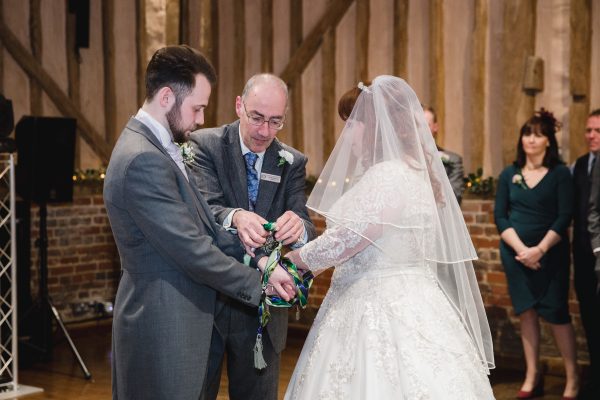
by Michael | Jun 25, 2024 | Blog
One of the beauties of celebrant-led ceremonies is that you can include whatever you want. Well, virtually.
You are not obliged to follow standard ritual or liturgy. You can mark your occasion anywhere and in, more or less, any way you choose.
So that can mean that your ceremony may appear quite wacky.
Not just because you may not be including any religious elements. Or even that your service is totally secular.
Things may be more extreme. You might include pagan rituals , such as handfasting or nature blessings, for example. You may choose to celebrate your event on the beach or in an aquarium, say.
The point is that the world is very much your oyster.
Those people who have heard of civil celebrants usually associate them with way-out ceremonies, which isn’t necessarily the case.
My own preferences lead me to specialise in ceremonies that are individual and unique, but not all that wacky. Although I’ve done a few way-out services too.
I’d define the majority of my ceremonies as semi-conventional. (People are often unaware that a celebrant-led service doesn’t have to be woo-woo.)
In fact, I can probably claim to be a bit of a specialist in mixed-faith ceremonies. Judaeo-Christian weddings seem to be my most popular services.
I normally draft elements of the respective religions (liturgy or culture) together, trying not to let one religion dominate, unless that is what all parties wish). The idea is that it should be seamless, but meaningful. If necessary, I will include explanations of what is going on, so guests don’t feel left out.
The important thing is that I am always in communication with the client and able to understand and meet their needs and desires. That way, I can build with them the service of their dreams, which can be meaningful and spiritual without necessarily being woo-woo.
Let’s have a chat and see how your ceremony can be made really special.
photo: Louiedonovanphotography.co.uk





